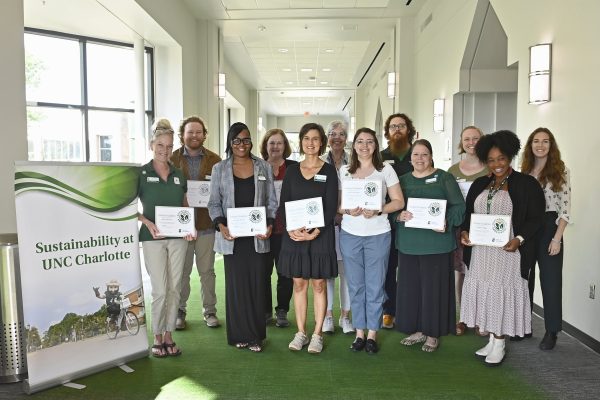Faculty and staff promote a culture of sustainability through ambassadors program

Charlotte’s faculty and staff are promoting a culture of sustainability on campus through the Sustainability Ambassadors program. Forty employees participated in the program’s inaugural cohort in 2023-24, and were recognized recently for their efforts at a campus celebration.
The Sustainability Ambassador Program is a professional development initiative for employees, adminstered through the Office of Sustainability. Participants learn about the University’s sustainability goals and practices, help promote a culture of sustainability on campus and ultimately make a positive difference within their departments and beyond by completing sustainability projects.
The program also contributes to the University’s strategic plan to “Create a culture where all University employees and students embrace their roles for achieving sustainability goals.”
The cohort represented a wide range of departments and positions from an associate vice chancellor to a recycling technician and faculty to office staff, leading to rich discussions in training sessions and the formation of new relationships across campus.
“The program allowed us to partner with departments across campus to deliver high-quality training and connect ambassadors with staff resources,” said Jessica Kisonas, education coordinator for the Office of Sustainability. “Building environmental services and recycling, energy management, dining services and the purchasing office were all valuable content contributors to the program.”
Meet some ambassadors
Alice Patterson, a budget analyst for personnel budget management, was asked by her director to participate. She jumped at the chance to learn more about sustainability on campus and get a behind-the-scenes look at campus operations.
“Through the program, I learned that Charlotte has 11 certified green buildings; I learned how styrofoam is recycled, how our buildings are heated and that our campus is continually looking at cost-saving measures,” said Patterson. “And now, I find myself peeking into trash cans and removing something that is recyclable.”
For her ambassador project, Patterson worked with Andrew Goff, lecturer in biological sciences, to host three panelists for a short film series.
Danielle Thorpe, assistant registrar for records, became a sustainability ambassador to understand the University from a different perspective. As a new Charlotte employee, the program enabled her to network with colleagues outside of her area while learning about the University’s strategic efforts to promote sustainability.
“The program created an opportunity for us to learn, interact and share our appreciation for those working to uphold our University’s will to practice sustainability,” said Thorpe. “From the tours, panels, presentations and projects, I’ve learned the little things matter. Everyone that is part of this program made it a priority to create a safe space to learn and ask questions.”
Ambassador Projects
Each ambassador was asked to complete a sustainability project. They could solve a challenge for their units, educate campus on a sustainability initiative, create or support a campus event or help their unit by joining the Green Workplace Program.
Parking and transportation services uses drone technology to reduce carbon emissions and improve efficiencies. Large campus events require real-time traffic monitoring. Previously, this task involved deploying staff in vehicles to monitor traffic flow manually, consuming fuel and time with minimal additional benefit. Drones provide a faster, more accurate way to assess traffic conditions, allowing personnel to adjust traffic flow in real-time, reducing congestion and improving overall event efficiency, all while minimizing our environmental impact.
Mark Lariviere, business systems integration manager for PaTS, will present “Campus from a Drone’s-Eye View,” from noon to 1 p.m. Thursday, Oct. 10 on the top floor of the Union Parking Deck, for his ambassador project. He will show participants how his team monitors and collects information for planning purposes on campus and those in attendance will also get to watch the drone in action.
“When used strategically, drones can save both financial resources and personnel hours,” said Lariviere. “Given my interest and knowledge in drone technology, it was a natural fit to explore how they could be integrated into campus operations, enhancing sustainability efforts and operational efficiency.”
Michaela Barger, undergraduate academic advisor in electrical and computer engineering, gave a telecommuting presentation during last week’s Transportation Fair for her ambassador project. She created a poster to help inform faculty, staff and students about sustainability arguments around telecommuting so they can factor them into their telecommuting decisions.
For her ambassador project, Suzanne Halaburda, first-year writing and senior lecturer, coordinated a campus film screening of “The Smell of Money,” along with a panel discussion. The film addresses the environmental and social impacts of large-scale animal agriculture by examining the years-long legal battle between North Carolina residents and a large meat company.
Halaburda received grants from the Charlotte Green Initiative (the student green fund) and the Writing, Rhetoric and Digital Studies Department’s Social Justice and Equity Fund for her project.
“The event menu was 100% plant-based out of respect for the people, ecosystems and animals harmed by industrial animal agriculture,” said Halaburda. “We worked with Chartwells and facilities management to make the event zero waste.”
Other projects include an alumni tailgating compost pilot, a light rail scavenger hunt, office competitions, a sustainability newsletter, a recycling education and training module, a curriculum workshop and a sustainable carpet vendor program, in addition to a variety of campus events and participation in the Green Workplace Program.
Learn more about the Sustainability Ambassadors program by visiting the Office of Sustainability website.